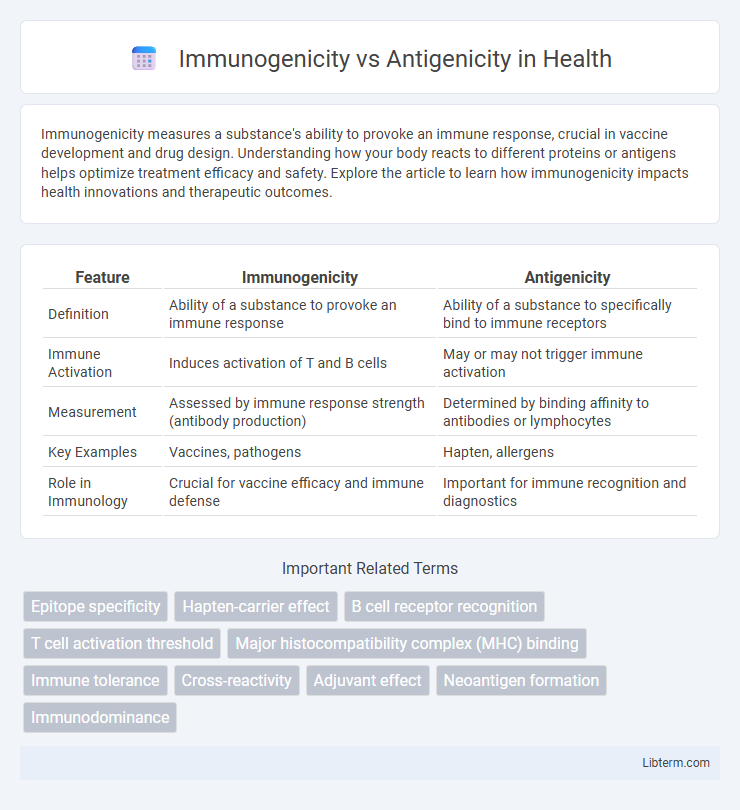Immunogenicity measures a substance's ability to provoke an immune response, crucial in vaccine development and drug design. Understanding how your body reacts to different proteins or antigens helps optimize treatment efficacy and safety. Explore the article to learn how immunogenicity impacts health innovations and therapeutic outcomes.
Table of Comparison
| Feature | Immunogenicity | Antigenicity |
|---|---|---|
| Definition | Ability of a substance to provoke an immune response | Ability of a substance to specifically bind to immune receptors |
| Immune Activation | Induces activation of T and B cells | May or may not trigger immune activation |
| Measurement | Assessed by immune response strength (antibody production) | Determined by binding affinity to antibodies or lymphocytes |
| Key Examples | Vaccines, pathogens | Hapten, allergens |
| Role in Immunology | Crucial for vaccine efficacy and immune defense | Important for immune recognition and diagnostics |
Introduction to Immunogenicity and Antigenicity
Immunogenicity refers to the ability of a substance, such as an antigen, to provoke an immune response by stimulating the production of antibodies or sensitized immune cells. Antigenicity describes the capacity of a molecule to specifically bind to the products of the immune response, such as antibodies or T-cell receptors, without necessarily eliciting that response. Understanding the distinction between these properties is crucial for vaccine development and immunotherapy, as effective immunogens must possess strong immunogenicity and high antigenicity.
Definitions: Immunogenicity vs Antigenicity
Immunogenicity refers to the ability of a substance, such as an antigen or vaccine, to provoke an immune response by stimulating the production of antibodies or activation of immune cells. Antigenicity is the capacity of a molecule to specifically bind to immune components like antibodies or T-cell receptors without necessarily eliciting an immune response. Understanding the distinction between immunogenicity and antigenicity is crucial for vaccine design, immunotherapy development, and diagnostic applications.
Key Differences Between Immunogenicity and Antigenicity
Immunogenicity refers to the ability of a substance to provoke an immune response and induce the production of antibodies or sensitized lymphocytes, while antigenicity is the capacity of a molecule to specifically bind to these immune components without necessarily triggering a full immune response. Key differences include that immunogenicity involves activation and amplification of the immune system, whereas antigenicity is limited to recognition and binding by immune receptors. Factors influencing immunogenicity include molecular size, complexity, and foreignness, whereas antigenicity depends primarily on the structural compatibility between the antigen and immune receptors.
Mechanisms Underlying Immunogenicity
Immunogenicity refers to the ability of a substance to provoke an immune response, primarily driven by antigen processing and presentation through major histocompatibility complex (MHC) molecules to T cells. This process involves dendritic cells capturing antigens, followed by activation of helper T cells and subsequent B cell stimulation, resulting in antibody production. Factors influencing immunogenicity include antigen size, complexity, dose, and the involvement of danger signals that activate innate immune pathways.
Factors Influencing Antigenicity
Antigenicity is influenced by factors such as molecular size, chemical complexity, structural stability, and the presence of epitopes recognized by the immune system. Foreignness to the host organism and the dose of the antigen also play crucial roles in determining antigenic strength. Higher antigenicity increases the likelihood of an immune response, distinguishing it from immunogenicity, which refers to the ability to provoke a specific immune reaction.
The Role of Immune System Cells
Immunogenicity measures the ability of a substance to provoke a specific immune response, involving activation of T cells, B cells, and the production of antibodies. Antigenicity refers to the capacity of an antigen to bind specifically to antibodies or antigen receptors on immune cells without necessarily eliciting an immune response. Immune system cells such as dendritic cells present antigens to lymphocytes, bridging antigenicity and immunogenicity through cell-mediated activation and adaptive immunity.
Clinical Implications of Immunogenicity
Immunogenicity refers to the ability of a substance to provoke an immune response, while antigenicity is the capacity to specifically bind to immune receptors such as antibodies or T-cell receptors. In clinical settings, immunogenicity of therapeutics like biologics can lead to reduced efficacy, adverse reactions, or treatment failure due to the formation of anti-drug antibodies (ADAs). Understanding and managing immunogenicity is crucial for optimizing drug safety, efficacy, and patient outcomes in immunotherapy and vaccine development.
Applications in Vaccine Development
Immunogenicity, the ability of a substance to provoke an immune response, is crucial in evaluating vaccine efficacy, ensuring robust activation of T and B cells for long-lasting immunity. Antigenicity refers to the capacity of a molecule to specifically bind to immune receptors such as antibodies, essential for accurate targeting in vaccine design. Understanding the balance between immunogenicity and antigenicity guides the optimization of vaccine components, enhancing protection against pathogens while minimizing adverse reactions.
Challenges in Measuring Immunogenicity and Antigenicity
Measuring immunogenicity poses challenges due to the complexity of immune responses, variability among individuals, and the influence of factors such as adjuvants, dosage, and delivery methods on the magnitude and duration of immune activation. Antigenicity evaluation is complicated by the need to distinguish between structural recognition by antibodies and the actual capacity to induce an immune response, requiring sophisticated assays that assess both antibody binding and T-cell activation. The lack of standardized protocols and the interplay between immune tolerance and cross-reactivity further complicate the accurate quantification of both immunogenicity and antigenicity in vaccine development and therapeutic protein assessment.
Future Perspectives and Research Directions
Future perspectives in immunogenicity research emphasize the development of personalized vaccines tailored to individual genetic profiles, enhancing immune response efficacy against variable pathogens. Advances in antigenicity analysis through high-throughput epitope mapping and machine learning algorithms promise improved prediction of antigenic determinants critical for next-generation immunotherapies. Integration of multi-omics data and synthetic biology approaches is driving innovative strategies to optimize immunogenic properties while minimizing adverse reactions in clinical applications.
Immunogenicity Infographic

 libterm.com
libterm.com